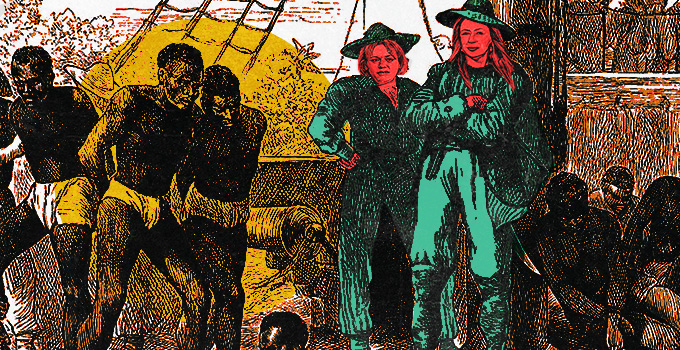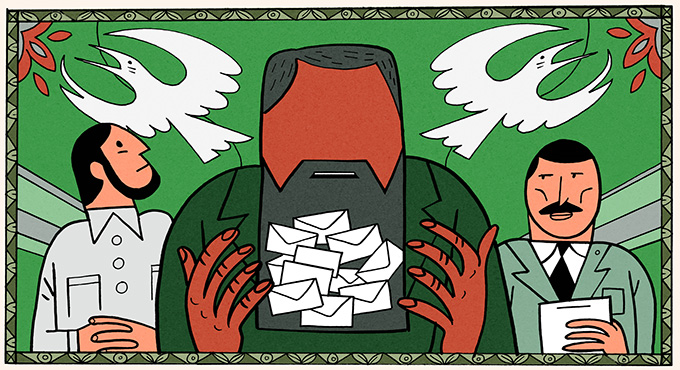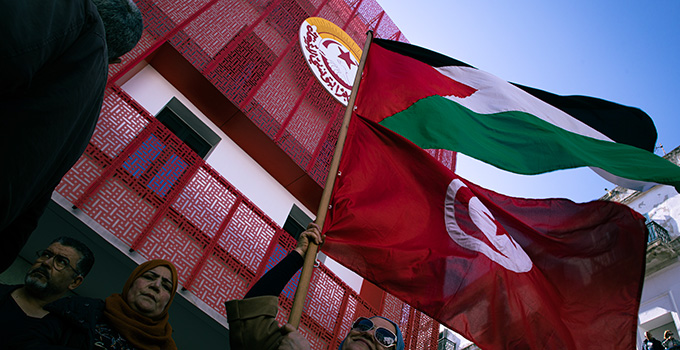Forty shades of green

Islam’s main political arms differ greatly in both tactics and aims. But that should not reassure America
EVER since the terrorist attacks of September 2001, George Bush has been telling Osama bin Laden and his al-Qaeda terrorist network they will fail in one of their main aims: to trigger a broad global conflict between America and its allies, and Islam. The president has called Islam a peaceful religion, bringing “hope and comfort” to over a billion people.
To judge by opinion polls, many Muslims around the world are unimpressed. To them, America’s actions in the Middle East tell a different story about Mr Bush’s attitude to their faith. And the president may not be right when he says that a broad clash of civilisations can be avoided. To anyone skimming the headlines in recent weeks, it seems as though believers in an imminent clash between Islam and the West have plenty of new evidence to support their case.
Iran—the country whose 1979 revolution put political Islam on the modern map—is cocking a snook at its western critics. Its president vows to destroy Israel and its nuclear researchers have defied the world by going back to work. In its present mood, Iran shows little interest in seeking “rehabilitation” by addressing the long list of western complaints, which include sponsoring terror.
Meanwhile, the leaders of al-Qaeda appear on videotapes to tell their supporters that the war against “crusaders” and Jews is very much alive. Mr bin Laden warns that deadly attacks on America are still being planned. His deputy, Ayman al-Zawahiri, appeared on the screen this week to declare that he has survived an American attempt on his life and that Allah, not Uncle Sam, would set the hour of his death.
At the same time, an Islamist movement that many western governments regard as terrorist and untouchable is savouring its stunning victory in the Palestinian elections. The Hamas triumph has brought delight to all its fellow members of the international fraternity known as the Muslim Brotherhood—from the refugee camps of Amman in Jordan, where sweets were eagerly handed out by local Brotherhood leaders, to their well-organised counterparts in the Islamic diaspora in Europe. Whatever Hamas now does, its success may be remembered as the biggest victory for political Islam since Iran’s Ayatollah Khomeini brought to the modern world the idea that Islam might be a formula for governance, law and spreading revolution.
For all these reasons, outside observers might be forgiven for thinking that political Islam, in various violent forms, was on the march against the West. In fact, the Islamist movement, though it may look monolithic from afar, is highly quarrelsome and diverse, and in many ways its internal divisions are deepening.
By no means everybody in the Muslim world rejoiced at the Hamas victory. It was disturbing in at least two different quarters. One was the corridors of power in Arab states, such as Jordan and Egypt, where the Brotherhood is already a powerful grass-roots movement and is steadily gaining confidence. In Egypt’s partially-free elections last November, the Brotherhood did far better than expected; and in Jordan, where the Brothers have long been treated as an innocuous vent for letting off anti-Israel and anti-western steam, the movement is demanding a higher profile.
Even more dismayed by the Hamas victory, it seems, are the al-Qaeda terrorist network and its sympathisers. They were already furious with Hamas for compromising with secular liberal ideas by taking part in multi-party elections, and the fact that Hamas has played the democratic game rather successfully will only increase their dismay.
Here lies a paradox. The two best known forms of political Islam (broadly speaking, al-Qaeda and the Brotherhood) have common ideological origins. Both have their roots in the anti-secular opposition in Egypt, a conservative reading of Sunni Islam and the wealth and religious zeal of the Saudis. But they differ hugely over politics and tactics.
Tactical allies, doctrinal enemies
The ideologists of al-Qaeda reject the division of the world into modern states. To them, the only boundaries that matter are between Islam (of which they believe they are the only authentic representatives) and infidels. By contrast, Hamas and Brotherhood thinking is pragmatic, accepting the reality of national boundaries.
Then compare political Islam among the Sunnis to the Shia variety, of which Iran is the vanguard. Vast religious differences, stemming from a split that occurred in the seventh century, separate these groups. They still give a sharp edge to the conflicts of the present day, most obviously in Iraq, where thousands of lives have been lost in Sunni-Shia violence.
In its doctrine and ethos, the simple, back-to-basics Sunni Islam from which the Brotherhood and al-Qaeda sprang is about as different as any Muslim practice could be from the sophisticated, scholarly world of the Iranian Shias, with their elaborate clerical hierarchy and long tradition of studying and adding to a corpus of texts. But when it comes to operational matters, especially against Israel, terrorist groups sponsored by Iran have no qualms about tactical co-operation with their Sunni counterparts. Hamas, for example, has good working relations with the al-Quds Force, an external arm of the Iranian Revolutionary Guard. And suicide bombings against Israeli civilians, now regarded as a Hamas trademark, were probably inspired at first by Hizbullah, an Iranian-backed, Shia movement based in Lebanon.
Yet doctrinal differences matter. In recent weeks, there has been an escalation of the war of words between al-Qaeda supporters on one hand and Hamas and the Brotherhood on the other. In January, a London-based website that reflects jihadist views—the belief in a broad, inexorable conflict between Islam and the West—cited 102 clerics, living and dead, to support the view that good Muslims should not take part in elections. For this ideological camp, any electoral exercise merely reinforces the blasphemous way of thinking that places human choices and regimes above the law of God. In the words of Stephen Ulph, an analyst of Islam at the Jamestown Foundation, a think-tank, al-Qaeda’s message to Hamas is something like this: “You’re still playing the western game—we can put away the chess board.”
Now that Hamas faces the reality of power and day-to-day challenges of administration, it must decide how much more of a “western game” it is prepared to play. It has already watered down its Islamist fervour by entering policy debates with its secularist, Palestinian-nationalist rivals in the Fatah movement, and may soon be deliberating the pros and cons of a tactical compromise with Israel.
And part of that dilemma will be ideological. Hamas leaders will need a theological licence from the Brotherhood’s spiritual guides for the political choices they make. At the same time, the world Brotherhood has a huge stake in the success of a Hamas government which could be a model of political Islam. For exactly that reason, predicts Ziad Abu Amr, a Palestinian legislator close to Hamas, the Brotherhood is likely in the end to provide “doctrinal cover and political support” for whatever decisions Hamas takes. But if those decisions include compromise with Israel, the doctrinal bit will not be easy. Despite its rejection of violence in most circumstances, the Brotherhood’s bottom lines have included deep ideological opposition to Israel’s existence and a demand for Muslim control over Jerusalem.
Given that theology will play a role, at least, in these deliberations, it is worth studying the ways in which different Islamist movements converge and differ. Al-Qaeda and the Brotherhood, for example, are both loosely articulated international movements which claim to operate, often through proxies and ideological soul-mates, in scores of countries. Both have emerged out of the conservative wing of Sunni Islam, which believes in sticking to the letter of the earliest texts as the main form of spiritual guidance.
In other ways, al-Qaeda and the Brotherhood are entirely different phenomena. Al-Qaeda is first and foremost a movement which sponsors and co-ordinates acts of violence, not just in the Islamic heartland but anywhere it can hit back at the western enemy. In the ideology of the Brotherhood, including Hamas, resort to violence is justified only in the exceptional circumstances of “self-defence” and “occupation”—conditions which are deemed to exist in Israel, the West Bank and American-occupied Iraq.
Rooted in shock
The ideological process which gave birth to al-Qaeda and the Muslim Brotherhood is worth retracing. Both grew out of Muslim shock at the advance of European colonialism in the 19th century and, in 1923, the fall of the last Ottoman caliph. To make matters worse, Britain and France then planted their flags in the Muslim heartlands as occupiers of the Levant.
Out of those shocks came, first, a movement called Salafism, which insisted that only the Prophet himself and the two generations that followed him should be relied on for spiritual guidance. Salafism is not necessarily violent, but became so when allied with the stark, puritan, uncompromising variety of Sunni Islam, known as Wahhabism, practised by the Saudi clergy. To that potent Egyptian-Saudi mixture was added the galvanising experience, for many young Muslims, of joining the American-backed war against Soviet forces in Afghanistan in the 1980s.
Al-Qaeda’s two main leaders personify that story: Mr bin Laden, the pampered son of a wealthy Saudi clan who found a new persona in Afghanistan, and Mr Zawahiri, an Egyptian doctor whose ideological roots lay in the Brotherhood and in resistance to his own country’s secular regime. Mr Zawahiri is an example of one part of the Brotherhood’s transition from peaceful struggle to violence—at first against the Egyptian government and other secular Arab regimes, and then by extension against the West.
This teaching was sharpened by Sayed Qutb, an Egyptian thinker who was hanged 40 years ago but still inspires Muslims with his stinging denunciations both of western hedonism—he wrote a famous outburst against American youngsters and their dance parties—and the decadence of supposedly Muslim regimes. Whether among Hamas voters in the Gaza slums or among Brotherhood thinkers, the ideas of Qutb enjoy huge influence.
The Brotherhood claims to have millions of adherents all over the world. Since it cannot operate openly in many places, the figures are vague. To borrow an expression from Marxism, the political strategy of the Brotherhood is “entryist”—it believes in participating in any democratic process that is available, and in taking advantage of the freedom the western world allows. “There are members of the Brotherhood in many western countries, but they don’t operate under that name—they work within different groups to spread their ideas,” says Kamal Helbawy, a London-based Egyptian who for years was among the few people in the West who spoke openly in Brotherhood’s name.
Mr Helbawy’s own career is a good example of the movement’s advance. The movements he has overseen were bankrolled by Saudi largesse. After working in Nigeria to promote Muslim education, he was invited to Saudi Arabia in 1972 to set up the World Assembly of Muslim Youth, one of several bodies that spread the faith in a stark, simple form. As head of WAMY, he spent a couple of decades in Saudi Arabia. There he mentored young Muslims from all over the world who later became influential in countries such as Malaysia, Indonesia and Turkey.
Shadowy, but not secret
At least in the western world, the Brotherhood seems to form a kind of parallel structure that would be familiar to historians of Northern Ireland’s Orange Order or the South Africa’s Broederbond, both fraternities in which evangelical Protestantism played a secret, binding role. On joining the Brotherhood, followers are required to take an oath which pledges them to “work for God’s message” and “believe and trust in” the movement’s leaders. A Brotherhood member is expected, with his comrades’ help, to cultivate ten virtues, including bodily health, a sound mind and punctuality.
In the diaspora at least, the practice of working through other movements and fronts has had some spectacular success, and has brought the Brotherhood and its proxies a degree of influence that far outweighs the number of its members. The Muslim Association of Britain was one of two main organisers of the “Stop the War” demonstrations that brought millions of Britons on to the streets to oppose the invasion of Iraq.
Mr Helbawy co-founded the MAB in 1997 as a movement close to, but not part of, the Brotherhood. On the French scene, easily the biggest single force in Muslim politics is the Union of Islamic Organisations of France, which denies formal ties with the Brotherhood but clearly has ideological links and is seen warily by French Muslims of other stripes. Both the method and the aims of the Brotherhood’s work will vary with local circumstances.
The movement’s belief in working through democracy and freedom of speech, says Mr Helbawy, is not just a short-term choice. Its founder, Hassan al-Banna, considered the parliamentary system the next best thing to an Islamic one. That does not mean that he thought democracy ideal. But even this belief in the legitimacy of multi-party politics enrages the likes of Mr bin Laden.
The stated aim of the Brotherhood is to re-Islamise society, and only thereafter the state. In this vision, the ultimate desirability of introducing sharia law, as laid down by the Koran, cannot be questioned. But the Brotherhood line is that this process should not be rushed: sharia can come into being only when the people have freely convinced themselves of its virtues.
The Brotherhood is certainly shadowy, but it is not a secret organisation. Its leader is an elderly Egyptian, Mehdi Akef, who presides over a series of councils dealing respectively with Egypt, the wider world and various categories of followers, including women, youth and professional groups. Its de facto spiritual guide, Sheikh Yusuf al-Qaradawi, is much better known, thanks to broadcasts and pronouncements on the internet which are followed by Muslims round the world. In perfect consistency with Brotherhood teaching, he has condemned terrorist attacks in western countries but excused them in Israel, Palestine and Iraq.
America as arbiter
Observing the ideological fights between al-Qaeda and the Brotherhood, and the physical fights between Sunnis and Shias, some American strategists might ask themselves: since they all oppose us and our allies, shouldn’t we take comfort from the fact that they hate each other too?
In reality, things don’t work that way. However little the arcana of Sunni or Shia theology are understood in Peoria or even in Washington, DC, the hard fact is that the American occupation of Iraq has made it appear, to many people in the Middle East, that America is now the main arbiter in the balance of power between the different components of the Islamic world. To put it another way, people who were already inclined to see almost every development in the Islamic world as America’s work will be harder to dissuade.
Despite the darkening clouds in America’s relationship with Iran, many Sunni Muslims are convinced that the Bush administration is subverting their faith by favouring the Shia cause in Iraq and hence promoting Iranian influence. In the slums of eastern Amman, for example, people hardly knew what Shia Islam was until recently. Now the word has spread that neighbouring Iraq is about to get a Shia-dominated government—and, moreover, that it is all America’s fault.
Nor can America escape this opprobrium by tilting its Iraqi policy a few degrees in a more pro-Sunni direction. Anything that seems to favour the Sunnis can also be interpreted as giving heart to the Saudi establishment, royal or clerical. And that in turn will be seen as a boost to Saudi efforts to spread various forms of Sunni fundamentalism all over the world.
The contrasts between different varieties of Islam, and Islamism, are not trivial—either in their teachings or the behaviour they inspire. The western world needs to know about them, if only to know which outcomes and shifts of policy are conceivable, and which are not. But woe betide any western strategist who thinks the problems of the Muslim world can be addressed by a policy of “divide and rule”. The most likely result of that is that western countries will be blamed for divisions that have already existed, in one form or another, since the founding of Islam.
Source: From The Economist print edition, Feb 2nd 2006.




iThere are no comments
Add yours